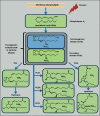The crucial roles of inflammatory mediators in inflammation: A review
- PMID: 29915501
- PMCID: PMC5993766
- DOI: 10.14202/vetworld.2018.627-635
The crucial roles of inflammatory mediators in inflammation: A review
Abstract
The inflammatory response is a crucial aspect of the tissues' responses to deleterious inflammogens. This complex response involves leukocytes cells such as macrophages, neutrophils, and lymphocytes, also known as inflammatory cells. In response to the inflammatory process, these cells release specialized substances which include vasoactive amines and peptides, eicosanoids, proinflammatory cytokines, and acute-phase proteins, which mediate the inflammatory process by preventing further tissue damage and ultimately resulting in healing and restoration of tissue function. This review discusses the role of the inflammatory cells as well as their by-products in the mediation of inflammatory process. A brief insight into the role of natural anti-inflammatory agents is also discussed. The significance of this study is to explore further and understand the potential mechanism of inflammatory processes to take full advantage of vast and advanced anti-inflammatory therapies. This review aimed to reemphasize the importance on the knowledge of inflammatory processes with the addition of newest and current issues pertaining to this phenomenon.
Keywords: chemokines; cytokines; inflammatory mediators; inflammatory response.
Figures


References
-
- Isailovic N, Daigo K, Mantovani A, Selmi C. Interleukin-17 and innate immunity in infections and chronic inflammation. J. Autoimmun. 2015;60:1–11. - PubMed
-
- Todd I, Spickett G, Fairclough L, editors. Lecture Notes:Immunology. New York: John Wiley & Sons; 2015.
-
- Huether S.E, McCance K.L. Understanding Pathophysiology. Förlag: Elsevier Health Sciences; 2015.
Publication types
LinkOut - more resources
Full Text Sources
Other Literature Sources
